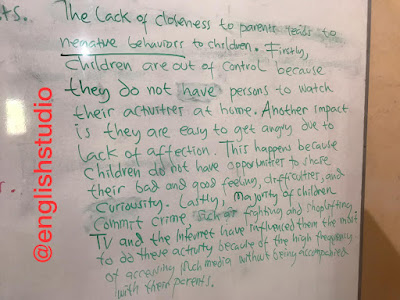IELTS itu tidak gampang. Tapi jika punya niat untuk mempelajarinya, maka pasti selalu aja ada jalan. Selama 1 bulan terakhir ini di bulan Mei, tepatnya di periode IELTS ENGLISH RAMADAN 2019, saya mengampuh kelas IELTS Pemula (paling dasar), yang kemampuan bahasa Inggris peserta yang ikut di kelas ini sangat terbatas. Mereka belum mampu memproduksi kalimat-kalimat yang panjang dan komplek.
Seperti yang saya bilang di atas, asal ada kemauan, pasti ada jalan. 4 peserta kelas IELTS dasar ini memiliki tekad yang kuat untuk mempelajari IELTS. Ini yang membuat saya semangat untuk mengajar mereka.
Yang namanya pembelajar pemula, saya perlu mengenalkan IELTS itu apa saja. Skill apa yang dibutuhkan untuk ditingkatkan agar mampu menjawab soal-soal IELTS, sehingga mereka mampu menggapai skor 5.0 dalam waktu 1 bulan ini. Pencapaian skor 5.0 bagi peserta yang memiliki kemampuan bahasa Inggris dasar merupakan mencapaian yang sangat luar biasa.
Singkat cerita, saya men-drilling mereka tiap hari dengan kalimat-kalimat yang sudah saya siapkan. Perlu diingat, peserta BASIC sangat tidak dianjurkan mempelajari grammar yang terlalu detail. Cukup memperkenalkan KALIMAT dan FRASE. Ini membantu mereka disaat mereka melakukan drilling.
Selanjutnya saya meminta mereka menghapal KALIMAT dan FRASE berdasarkan topik-topik ringan yang sering muncul di pertanyaan speaking dan writing IELTS.
Menghapal bagi sebagian orang sulit, begitupun yang dialami oleh 4 orang peserta BASIC IELTS ini. Tapi dengan semangat yang ber-api-api, mereka mampu sedikit demi sedikit menghapal KALIMAT-KALIMAT yang baru dan aneh menurut mereka.
Setelah mereka menghapal kalimat-kalimat yang sudah saya siapkan, kemudian saya mengajarkan mereka menyusun kalimat -kalimat itu menjadi sebuah paragraf, tentu saja dengan lebih dulu mengenalkan KATA SAMBUNG (linking words) dan mempelajari fungsinya dalam kalimat.
Cara belajar ini kami lakukan 9 jam sehari selama 20 hari. Apakah ada rasa BOSAN di sana? Ya betul, tapi kami selalu percaya, rasa BOSAN ini hanya sementara saja, toh akan hilang jika kita tetap terus melakukan aktivitas belajar.
Di hari ke-19, sehari sebelum melakukan FINAL TEST, saya pun memberikan MINI-EXAM ke mereka untuk mengukur kemampuan mereka dalam menulis esai.
Dan apa yang terjadi? Mereka mampu membuat 1 full essay dengan waktu 1 jam. Dan pencapain ini sangat luar biasa bagi peserta yang memiliki kemampuan bahasa Inggris dasar, hampir NOL, yang mempunyai tekad besar untuk mempelajari IELTS.
Kamu ingin juga seperti mereka?
Kamu ingin juga seperti mereka?
Jika ingin belajar IELTS dengan saya di English Studio Kampung Inggris Pare atau di tempat kamu, silahkan DM saya di Instagram: @eddysuaib / INSTAGRAM ENGLISH STUDIO: @englishstudio
Dan jika kamu tertarik mengikuti kelas IELTS ONLINE via Whatsapp saya, silahkan kontak ke 0813.1818.6060 atau kunjungi website ENGLISH STUDIO INDONESIA
Dan jika kamu tertarik mengikuti kelas IELTS ONLINE via Whatsapp saya, silahkan kontak ke 0813.1818.6060 atau kunjungi website ENGLISH STUDIO INDONESIA




















